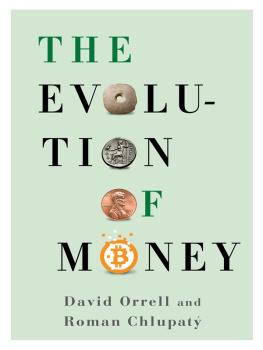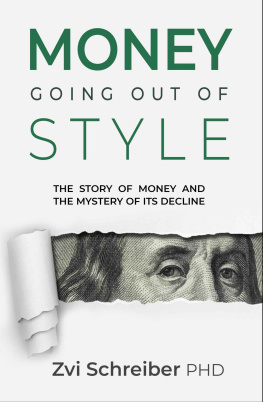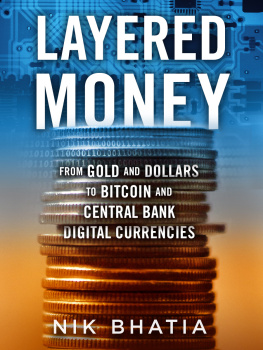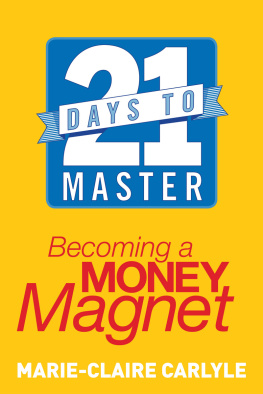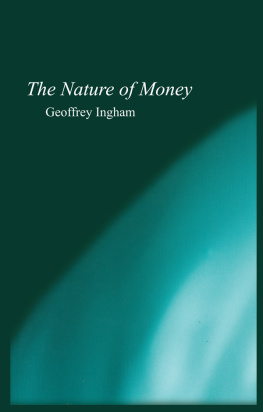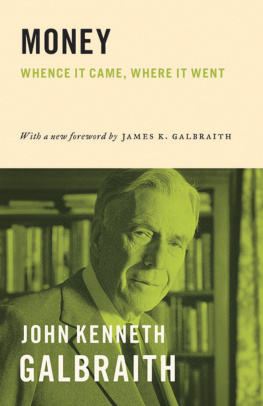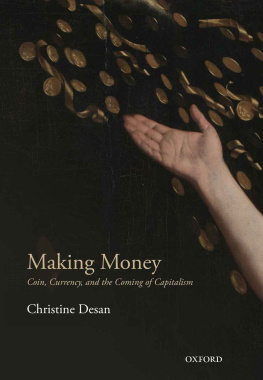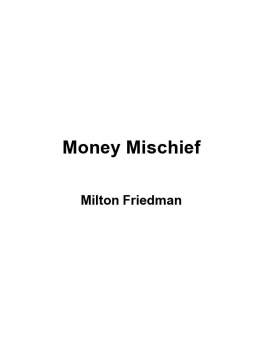Table of Contents
THE EVOLUTION OF MONEY
Columbia University Press
Publishers Since 1893
New York Chichester, West Sussex
cup.columbia.edu
Copyright 2016 Columbia University Press
All rights reserved
E-ISBN 978-0-231-54167-1
Library of Congress Cataloging-in-Publication Data
Names: Orrell, David, author. | Chlupat, Roman, author.
Title: The evolution of money / David Orrell and Roman Chlupat.
Description: New York : Columbia University Press, [2016] |
Includes bibliographical references and index.
Identifiers: LCCN 2015050683 | ISBN 9780231173728 (cloth : alk. paper)
Subjects: LCSH: MoneyHistory.
Classification: LCC HG231 .O77 2016 | DDC 332.4/9dc23
LC record available at http://lccn.loc.gov/2015050683
A Columbia University Press E-book.
CUP would be pleased to hear about your reading experience with this e-book at .
COVER DESIGN: Noah Arlow
CONTENTS
Many people contributed to this book. We would like to thank Myles Thompson and Robert Lecker for their advice and encouragement, and Stephen Wesley, Irene Pavitt, and Ben Kolstad for their expert editorial and copy-editorial advice. Credit also goes to all those who have shared their time and expertise on various subject matters related to The Evolution of Money, especially Parag Khanna, Tom Sedlek, Marek Palatinus, and Rob Carnell and James Knightley of INGs London office.
Roman would like to thank his dear friend and mentor Roger Tooze for providing him with invaluable advice and serving as a critical voice during the writing of this book. He would also like to extend his deepest and sincerest gratitude to his lovely wife, Klara, and his lively daughter, Dominika, for their help, support, and patience (not only) during the time spent writing this book. David would like to thank his wife, Beatriz (better than money), and his daughters, Isabel and Emma, who also evolved as this book was written.
Finally, the authors would like to thank each other for an enjoyable and mutually inspiring collaboration.
David would like to dedicate this book to Emma, and Roman would like to dedicate it to Sebastian.
The thing that differentiates man from animals is money.
GERTRUDE STEIN, MONEY
Money talks because money is a metaphor, a transfer, and a bridge.
MARSHALL MCLUHAN, UNDERSTANDING MEDIA: THE EXTENSIONS OF MAN
This book is about the nature and future of moneythat mercurial substance that dominates so much of our lives, remains strangely elusive and misunderstood, can drive us forward or dash us against the rocks, and whose evolution may play a deciding role in the future success and prosperity of our species.
Money is one of mankinds earliest inventions. Its history appears to be as old as that of writing, and the two are closely connectedsome of the oldest written artifacts in existence are 5,000-year-old clay tablets from Mesopotamia that were used to record grain deposits. Both money and writing are a way of using symbols to describe the world. Both are used as a means of communication, and thus are fundamentally social and central to the relationship between individuals and the state. Money, in many respects, is as closely tied to our way of thinking as words.
Like language, money is based on social conventions, the most important being agreement on what constitutes a standard of currency. In the same way that words for the same thing differ between languages, so the choice of money is flexible, everything from cowrie shells in ancient China to cigarettes in postwar Germany having served as lucre. The first metal coins appeared around 600 B.C.E. when the small but trade-friendly kingdom of Lydia (in present-day Turkey) introduced tokens made from a naturally occurring alloy of gold and silver. Today, money has transcended a physical relationship with precious metals, or for that matter anything else. The concept of currency has become increasingly abstract, to the point where actual coins and notes form only a small portion of the money in existence. Like words in the cloud, money exists as an abstract set of symbols that can be created or destroyed with the press of a keyboard button or the touch of a screen. Cybercurrencies are revolutionizing the financial industry in the same way that e-books are revolutionizing the publishing industry.
This virtual, ethereal form of money underpins modern capitalism, and its pursuit determines much of the structure of our lives. Jobs are often seen largely as a means to obtain it. Our houses are seen not just as homes but as stores of wealthwhere wealth is defined as something that can be converted, at least in principle, to money. An important measure of success for people is the numbers they make or the net worth they accumulate over their lives; for a country, its gross domestic product as measured in its national currency. Displays of wealth provide a form of validation within the community, and the pursuit of riches lends shape and meaning to our lives. Money, for many people, is not just a necessity of modern life; it is something closer to a religion (indeed, without such faith, the system would collapse). As the British Museum observes, money has become the main motivating factor behind western culture the prime focus of political debate and personal endeavor, both despite and because of its increasing elusiveness and power. This kind of attitude has been aptly termed fetishistic, in the sense that it attributes a quasi-supernatural quality to the object of its adulatory devotion, in this case money.
Money is also a source of worry. According to Gallup, Half of Americans have substantial financial anxiety. And yet, despite its obvious importance in our lives, we often tend to downplay money, saying it is nothing special in itself, no more than a glorified system for exchange and accounting. And despite the long history of our relationship with it, we dont seem to know it very well. Its properties are something of a blank page.
For example, the credit crunch in 2007 that kicked off the ensuing financial crisis was one of a long series of such events caused in large part by the dynamics of money and our inability to understand them. Like those other events, it came as a complete surprise to nearly everyone, including major financial institutions such as the International Monetary Fund (IMF) and the Organisation for Economic Co-operation and Development (OECD). We appear to be as helpless in the face of financial storms as our ancestors were to more natural cataclysms such as storms or volcanoes. Wealth that is built up over decades can seem to vanish into the ether, as if it had no substance.
A commonly held currency is seen as a unifying force, which bonds people together, like a shared national anthem. In Europe, the euro was intended to bring disparate member states together and eliminate the risks of the deadly conflicts that characterized much of its history. While that goal has been reached, the common currency has in some respects had the opposite effect, enhancing the differences between north and south, between Greeks and Germans. Indeed, money often seems to have a way of pulling people apart even within a single country: a defining feature of modern capitalism is extreme wealth inequality and the resulting threat of social conflict.

